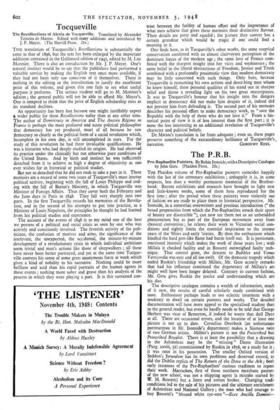Tocque - ville
The Recollections of Alexis de Toequeville. Translated by Alexander Teixeira de Mattos. Edited with many additions and introduced by J. P. Mayer. (The Harvill Press. 21s.)
THIS translation of Tocqueville's Recollections is substantially the same as that of 1896, but the text has been enlarged by the important additions contained in the Gallimard edition of 1942, edited by M. Luc Monnier. There is also an introduction by Mr. J. P. Mayer. One's natural instinct would be to say that the publishers had performed a valuable service by making the English text once more available, if they had not been only too conscious of it themselves. There is nothing in the editing or the introduction to justify the exorbitant price of this volume, and given this one fails to see what useful purpose it performs. The serious student will go to M. Monnier's edition ; the general public will not be able to afford Mr. Mayer's. One is tempted to think that the price of English scholarship rises as its standard declines.
An opportunity has been lost because one might justifiably expect a wider public for these Recollections today than at any other time. The author of Democracy in America and The Ancien Regime in France is perhaps the most profound and acute political philosopher that democracy has yet produced, most of all because he saw democracy so clearly as the political form of a social revolution which, Incomplete in his own day, is still uncompleted in ours. For the study of this revolution he had three invaluable qualifications. He was a historian who had deeply studied its origins. He had observed its practice under the clinically but not otherwise pure conditions of the United States. And by birth and instinct he was sufficiently detached from it to achieve as high a degree of objectivity as one ever wishes for in historical or political studies.
Aut not so detached that he did not rush to take a part in it. These memoirs are a record of some two years of Tocqueville's most intense political activity, beginning with the fall of Louis Philippe and end- ing with the fall of Barrot's Ministry, in which Tocqueville was Minister of Foreign Affairs. Thus they cover both the February and the June days in Paris in 1848. They fall very sharply into two parts. In the first Tocqueville records his memories of the Revolu- tion, and in the second of his attempts to put into practice, as a Minister of Louis Napoleon, the principles he thought he had learned from his political studies and experience. The account of the events of 1848 is to my mind one of the best we possess of a political and social crisis as seen by one who was actively and consciously involved. The feverish activity of the poli- ticians, the confusion of motives and aims, the significance of the irrelevant, the unexpected, the accidental, the minute-by-minute development of a revolutionary crisis in which individual ambitions seem trivial and men's actions like those of sleepwalkers ; all these have never been better portrayed, and yet at the same time Tocque- ville conveys his sense of some great anonymous force at work which gives a kind- of nobility to his narrative. Nothing could be more brilliant and acid than his rapid portraits of the human agents in these events ; nothing more sober and grave than his analysis of the process in which they were playing a part. It is this sustained con- trast between the futility of human effort and the importance of what men achieve that gives these memoirs their distinctive flavour. Their details are petty and squalid • the picture they convey has a certain grandeur which would be tragic if one could find a meaning in it. One finds here, as in Tocqueville's other works, the same sceptical conservatism combined with an almost clairvoyant perception of the dominant forces of the modern age ; the same love of France com- bined with the sharpest insight into her vices and weaknesses ; the same belief in the liberal abstractions of Freedom, Justice and Truth combined with a profoundly pessimistic view that modern democracy may be little concerned with such things. Only here, because Tocqueville is recounting his own actions and describing men whom he knew himself, these personal qualities of his stand out in sharper relief and throw a revealing light on his two great masterpieces. It was to Tocqueville's honour that his insight into the dangers implicit in democracy did not make him despair of it, indeed did not prevent him from defending it. The second part of his memoirs describes his personal effort to make democracy work, to " save the Republic with the help of those who do not love it." From a his- torical point of view it is of less interest than the first part ; it is none the less interesting as an additional revelation of Tocqueville's character and political beliefs. De Mattos's translation is far from adequate • even so, these pages preserve something of the extraordinary brilliance of Tocqueville's










































 Previous page
Previous page